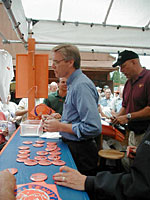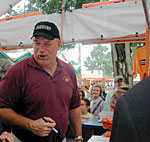By Michael Khoo
Minnesota Public Radio
September 12, 2002
Former DFL Congressman Tim Penny gave Minnesota's political pot a good stir over the summer when he threw his lot in with Gov. Jesse Ventura and the Independence Party. Penny's decision to seek the party's gubernatorial nomination came on the heels of Ventura's own decision not to seek re-election and immediately shifted the dynamics in this year's governor's race. Although he was the last major party hopeful to jump into the race, all signs indicate Penny is the frontrunner.
| |
|
|
|
||
Tim Penny is piling on the miles these days, criss-crossing the state in an orange mini-bus dubbed the "Common Sense Express," staking out what he's calling the "sensible center."
At a recent stop in Stillwater, the talk ranged from familiar pleasantries to sharper questions regarding the town's aging lift bridge. But the question that seems always just under the surface occassionally breaks through.
"Are you going to replace Jesse or what?" one person asks.
"Well, I hope so. That's the plan," responds Penny. He's, somber, articulate, and detail-oriented and may seem like the last person Minnesota voters would associate with Ventura's bluster and bravado.
But the two have a long-standing relationship that began when Penny helped Ventura make his transition into office. Since then, Penny has played an informal advisory role to the governor and Ventura has become his most vocal cheerleader.
"Tim Penny and I don't look alike. Tim Penny and I don't sound alike. We're completely different people on those two aspects. But I will say this: our hearts are the same. What is inside Tim Penny and what is inside Jesse Ventura I believe is very much alike," Ventura says.
The governor often rails against career politicians, yet he's chosen to put his legacy in the hands of a six-term congressman and self-described policy wonk.
Penny began his public life as a Democratic state senator in 1976. Six years later, he defeated an incumbent Republican congressman and was on his way to Washington, representing the southeastern corner of the state where he was born and had grown up. Penny spent the next 12 years in D.C. where he earned a reputation as a budget hawk, calling on his colleagues to rein in runaway federal deficits.
"We were a force to be reckoned with within that institution. We had a group of moderate Democrats that often voted as a block. And we had a lot of influence over our party leadership in pulling them in a somewhat direction on spending issues," recalls Penny.
Former Republican Congressman Vin Weber served with Penny during those years, and the two now co-direct the Humphrey Institute Policy Forum at the University of Minnesota. Weber says even during the '80s and early '90s, Penny was already showing the independent streak that would ultimately cause him to leave the DFL.
|
"The Republicans will learn a little more slowly that he draws just about as much from them as he does from the Democrats. "
- Vin Weber |
"He was liked and respected. Always a maverick. Always an independent voice. I might almost say held in somewhat higher regard by Republicans than by the leadership of his own party because of his maverick stance. And I think that endeared him to the voters," Weber says.
In Congress, Penny was also known as a strong opponent of legalized abortion. He vigorously opposed public funding for the procedure during those years. But he now says he has no interest in changing current abortion law, and in particular would not accept a waiting period for woman seeking the procedure.
"I have come to believe that this is a decision only a woman can make. And that the best thing we can do in terms of public policy is to help provide programs and services that lead to fewer unwanted pregnancies so that fewer women are faced with this god-awful decision in their lives," he says.
His evolving stance on abortion has earned him few friends on either side of the divisive issue. And his work since retiring from Congress in 1994 has also raised eyebrows.
In addition to his university positions, he's acted as a health care consultant for a group sponsored by the nation's leading health care and pharmaceutical companies. And he's worked for the Cato Institute, a Libertarian think-tank based in Washington. While at Cato, Penny wrote extensively on the need to reform Social Security and advocated a system of private retirement accounts to augment the system. During that time, he advanced his reputation as a fiscal conservative.
In 1999 he co-authored a federal budget proposal that calls for, among other things, the elimination of the Conservation Reserve Program, Federal Crop Insurance, federal welfare grants to the states, the National Labor Relations Board, and the Securities and Exchange Commission.
| |
|
|
|
||
Democrat David Lillehaug, a co-host of the local public-affairs show Face to Face, says if voters understand Penny's true colors, they won't find him so "sensible" or so "centrist."
"I can't understand how someone with that view, who has published the way that he has, could as governor of the state of Minnesota go to Congress and ask the federal government to help our state. How can you do that, for example, when we have a flood in Minnesota, when you've called for the elimination of National Flood Insurance?" says Lillehaug.
Penny, however, says although he helped write the proposal, the specific cuts don't necessarily reflect his personal priorities.
But Penny's work at Cato is already drawing critiques from DFL candidate Roger Moe's camp. Moe originally worried aloud that he and Penny, the former Democrat, would be "fishing in the same pond" for votes. Now Moe points to Penny's Cato record as evidence that the former congressman is further to the right than most Republicans.
So far, GOP candidate Tim Pawlenty has more or less resisted the chance to take a shot.
Former Congressman Weber, who supports Pawlenty, says that may change as Penny cements his centrist image. "The Republicans will learn a little more slowly that he draws just about as much from them as he does from the Democrats. And so although they may have thought at the outset of this campaign that Penny's candidacy was a probably good thing for them and they could just leave him alone and let him fight with Roger Moe, that reality is going to change," Weber suggests.
But as the criticisms come from the left and the right, it only bolsters Penny's assertion that he's sitting snuggly in the center -- where most Minnesotans are.
Penny says it wasn't an easy decision to leave the DFL, or for his running mate Martha Robertson to leave the Republicans. But he says he sees greater opportunities -- and more flexibility -- in the fledgling Independence Party.
"This is a big gamble. This is a big risk. This is something most politicians wouldn't do. On the other hand, you know, I think when they say this is just a party of castaways, they're the ones that are casting people out because they're too moderate, casting people out because they're not partisan enough, not toeing the party line enough, not attending to the interest group base enough," he says.
Independence Party officials are delighted to have Penny onboard. They say his candidacy can help cement the IP and demonstrate it's more than the Jesse Ventura fan club that its critics contend it is. And the party has already made some impressive gains. In this week's primary voting, turnout for the IP contest was more than twice what it was in '98 for Ventura's contest. And that's despite an overall smaller turnout.
More from MPR

